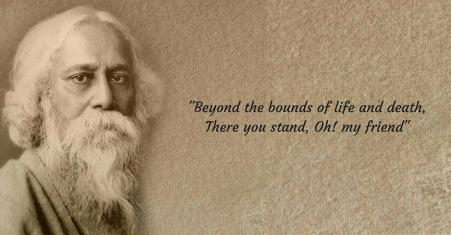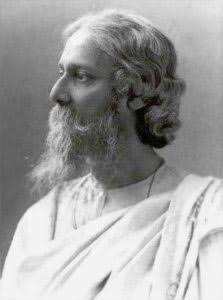Rabindranath Tagore as "Gurudev," was a towering figure !रवीन्द्रनाथ टैगोर, जिन्हें अक्सर "गुरुदेव" कहा जाता है,
रवीन्द्रनाथ टैगोर, जिन्हें अक्सर "गुरुदेव" कहा जाता है, भारत के सांस्कृतिक और साहित्यिक परिदृश्य में एक महान व्यक्ति थे। वह एक कवि, दार्शनिक, संगीतकार, कलाकार, नाटककार और शिक्षक थे। भारत पर टैगोर के प्रभाव को विभिन्न आयामों से समझा जा सकता है:
साहित्यिक योगदान : कविताओं, लघु कथाओं, उपन्यासों और नाटकों सहित टैगोर की साहित्यिक कृतियों ने भारतीय साहित्य पर एक अमिट छाप छोड़ी है। उनके कविता संग्रह "गीतांजलि" ने उन्हें 1913 में साहित्य का नोबेल पुरस्कार दिलाया, जिससे वह यह सम्मान पाने वाले पहले गैर-यूरोपीय बन गये। उनका लेखन भारतीय लोकाचार में गहराई से निहित था, जो देश की विविधता, आध्यात्मिकता और सामाजिक मुद्दों को दर्शाता था।
राष्ट्रगान : टैगोर ने "जन गण मन" के बोल लिखे, जिसे बाद में भारत के राष्ट्रगान के रूप में अपनाया गया। यह गीत देश की विविधता में एकता के सार को खूबसूरती से दर्शाता है और विभिन्न राष्ट्रीय कार्यक्रमों में गर्व के साथ गाया जाता है।
शैक्षिक दर्शन : टैगोर ने पश्चिम बंगाल के शांतिनिकेतन में विश्वभारती विश्वविद्यालय की स्थापना की। उनके शैक्षिक दर्शन ने एक समग्र दृष्टिकोण पर जोर दिया, जहां सीखना पाठ्यपुस्तकों तक सीमित नहीं था बल्कि रचनात्मकता, कला और प्रकृति की भावना से ओत-प्रोत था। इस दृष्टिकोण का उद्देश्य सर्वांगीण व्यक्तियों को बढ़ावा देना है।
सामाजिक सुधार और राष्ट्रवाद : टैगोर सामाजिक मुद्दों में गहराई से लगे हुए थे और विभिन्न सामाजिक सुधार आंदोलनों का समर्थन करते थे। वह ब्रिटिश औपनिवेशिक शासन के आलोचक थे और अपने लेखन के माध्यम से अपना विरोध व्यक्त करते थे। जहां उन्होंने भारतीय संस्कृति और परंपराओं की वकालत की, वहीं वे आधुनिकता को अपनाने में भी विश्वास रखते थे।
सांस्कृतिक राजदूत : टैगोर की विदेश यात्राओं, जिसमें अल्बर्ट आइंस्टीन जैसी प्रमुख हस्तियों के साथ उनकी बातचीत भी शामिल थी, ने विश्व स्तर पर भारतीय संस्कृति और दर्शन को बढ़ावा देने में मदद की। उनकी अंतर्राष्ट्रीय मान्यता ने भारत की सांस्कृतिक प्रोफ़ाइल को ऊपर उठाने में महत्वपूर्ण भूमिका निभाई।
कलात्मक उद्देश्य : टैगोर एक प्रखर चित्रकार और संगीतकार थे। उन्होंने अपने चित्रों में एक अनूठी दृश्य भाषा बनाई, जिसमें अक्सर पारंपरिक भारतीय शैलियों को आधुनिक प्रभावों के साथ जोड़ा जाता था। रवीन्द्र संगीत की रचना सहित उनका संगीत, भारतीय सांस्कृतिक विरासत का एक अभिन्न अंग बना हुआ है।
सामाजिक सद्भाव : टैगोर की कृतियाँ अक्सर एकता, सहिष्णुता और सद्भाव के संदेश देती थीं। उन्होंने विभाजनकारी बाधाओं को पार करने और सभी लोगों की साझा मानवता को अपनाने के महत्व पर जोर दिया।
संक्षेप में, भारत के लिए रवीन्द्रनाथ टैगोर का योगदान बहुआयामी और गहरा है। उनकी रचनात्मक प्रतिभा, दार्शनिक अंतर्दृष्टि और सामाजिक प्रगति के प्रति प्रतिबद्धता भारत और दुनिया भर में पीढ़ियों को प्रेरित करती रहती है।
एक शिक्षक के रूप में, मैं, सुनील सर, शिक्षा के प्रति टैगोर के समग्र दृष्टिकोण और सर्वांगीण व्यक्तियों के पोषण के प्रति उनके समर्पण से प्रेरणा ले सकते हैं। (Translated by Google)
Original version in English
Rabindranath Tagore, often referred to as "Gurudev," was a towering figure in India's cultural and literary landscape. He was a poet, philosopher, musician, artist, playwright, and educator. Tagore's impact on India can be understood through various dimensions:1. Literary Contribution: Tagore's literary works, including poems, short stories, novels, and plays, have left an indelible mark on Indian literature. His collection of poems "Gitanjali" won him the Nobel Prize for Literature in 1913, making him the first non-European to receive this honor. His writings were deeply rooted in Indian ethos, reflecting the country's diversity, spirituality, and social issues.
2. National Anthem: Tagore composed the lyrics of "Jana Gana Mana," which was later adopted as India's national anthem. The song beautifully captures the essence of the country's unity in diversity and is sung with pride at various national events.
3. Educational Philosophy: Tagore founded Visva-Bharati University in Santiniketan, West Bengal. His educational philosophy emphasized a holistic approach, where learning was not limited to textbooks but was imbued with a sense of creativity, art, and nature. This approach aimed to foster well-rounded individuals.
4. Social Reform and Nationalism: Tagore was deeply engaged in social issues and supported various social reform movements. He was critical of British colonial rule and voiced his opposition through his writings. While he advocated for Indian culture and traditions, he also believed in embracing modernity.
5. Cultural Ambassador: Tagore's travels abroad, including his interactions with prominent figures like Albert Einstein, helped promote Indian culture and philosophy globally. His international recognition played a significant role in raising India's cultural profile.
6. Artistic Pursuits: Tagore was a prolific painter and musician. He created a unique visual language in his paintings, often combining traditional Indian styles with modern influences. His music, including the composition of Rabindra Sangeet, continues to be an integral part of Indian cultural heritage.
7. Social Harmony: Tagore's works often carried messages of unity, tolerance, and harmony. He emphasized the importance of transcending divisive barriers and embracing the shared humanity of all people.
In summary,
Rabindranath Tagore's contributions to India are multifaceted and profound. His creative genius, philosophical insights, and commitment to social progress continue to inspire generations in India and around the world.
As an educator, I, Sunil Sir, can draw inspiration from Tagore's holistic approach to education and his dedication to nurturing well-rounded individuals.






Comments
Post a Comment